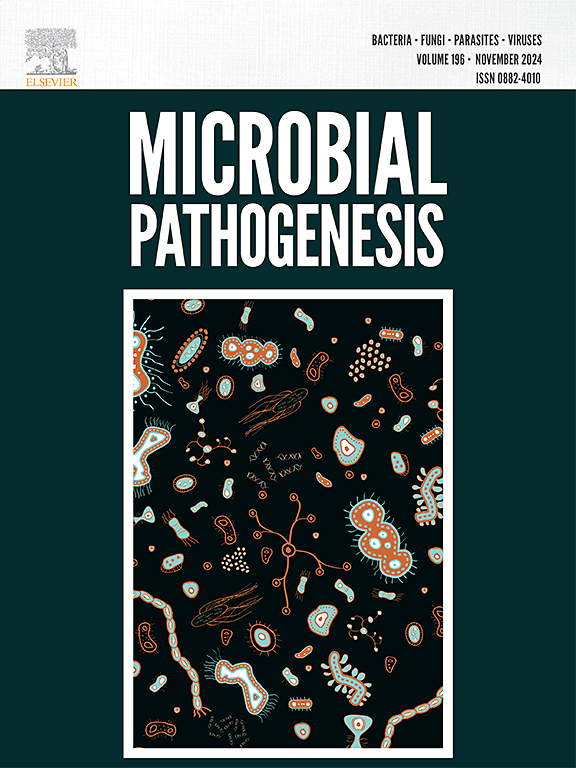Molecular mechanisms of resistance in Morganella morganii with exclusive resistance to imipenem: Whole genome sequencing analysis of 12 clinical isolates
IF 3.3
3区 医学
Q3 IMMUNOLOGY
引用次数: 0
Abstract
Background
Morganella morganii (M. morganii) is a significant opportunistic pathogen, increasingly linked to infections with high mortality rates.
Objective
This study aimed to explore the resistance mechanisms and molecular profiles of 12 clinical M. morganii isolates exclusively resistant to imipenem, employing whole genome sequencing (WGS) to guide infection prevention and control strategies.
Methods
A retrospective analysis of 12 isolates from a tertiary hospital, collected between May 2014 and March 2023, was conducted, incorporating strain identification and antimicrobial susceptibility testing. Genomic data were acquired via WGS, followed by gene analysis and replicon typing using Abricate. A broader epidemiological assessment of 227 Morganella isolates was performed using Snippy, Gubbins, and FastTree, leading to the construction of a phylogenetic tree to delineate evolutionary relationships.
Results
Three M. morganii isolates were identified as exclusively imipenem-resistant, while remaining susceptible to meropenem and ertapenem, each harboring carbapenemase resistance genes, blaKPC-2, blaNDM-1, and blaOXA-48, respectively. Replicon type analysis revealed that isolate GK07 carried two replicons: IncL/M(pOXA-48)_1_pOXA-48 and IncX8_1.
Conclusion
These findings suggest that selective imipenem resistance in M. morganii may be associated with carbapenemase genes and the potential for plasmid-mediated horizontal transmission of resistant clones. The results highlight the need for continuous monitoring of resistance gene dissemination across hosts, targeted interventions to curb resistant clone spread, and sustained vigilance regarding global epidemiological trends.
亚胺培南独家耐药摩氏摩根菌耐药分子机制:12株临床分离株全基因组测序分析
摩根氏摩根氏菌(M. morganii)是一种重要的条件致病菌,与高死亡率感染的关系日益密切。目的探讨临床分离的12株对亚胺培南耐药的莫氏分枝杆菌的耐药机制和分子特征,利用全基因组测序技术指导感染防控策略。方法对2014年5月至2023年3月在某三级医院采集的12株分离株进行回顾性分析,包括菌株鉴定和药敏试验。通过WGS获取基因组数据,然后使用Abricate进行基因分析和复制子分型。使用Snippy、Gubbins和FastTree对227株摩根菌分离株进行了更广泛的流行病学评估,从而构建了一个系统发育树来描述进化关系。结果3株摩氏分枝杆菌对亚胺培南完全耐药,对美罗培南和埃他培南敏感,分别携带碳青霉烯酶耐药基因blaKPC-2、blaNDM-1和blaOXA-48。复制子型分析显示,分离株GK07携带两个复制子:IncL/M(pOXA-48)_1_pOXA-48和IncX8_1。结论摩氏分枝杆菌对亚胺培南的选择性耐药可能与碳青霉烯酶基因有关,耐药克隆可能通过质粒介导水平传播。这些结果强调需要持续监测耐药基因在宿主间的传播,采取有针对性的干预措施以遏制耐药克隆的传播,并对全球流行病学趋势保持警惕。
本文章由计算机程序翻译,如有差异,请以英文原文为准。
求助全文
约1分钟内获得全文
求助全文
来源期刊

Microbial pathogenesis
医学-免疫学
CiteScore
7.40
自引率
2.60%
发文量
472
审稿时长
56 days
期刊介绍:
Microbial Pathogenesis publishes original contributions and reviews about the molecular and cellular mechanisms of infectious diseases. It covers microbiology, host-pathogen interaction and immunology related to infectious agents, including bacteria, fungi, viruses and protozoa. It also accepts papers in the field of clinical microbiology, with the exception of case reports.
Research Areas Include:
-Pathogenesis
-Virulence factors
-Host susceptibility or resistance
-Immune mechanisms
-Identification, cloning and sequencing of relevant genes
-Genetic studies
-Viruses, prokaryotic organisms and protozoa
-Microbiota
-Systems biology related to infectious diseases
-Targets for vaccine design (pre-clinical studies)
 求助内容:
求助内容: 应助结果提醒方式:
应助结果提醒方式:


